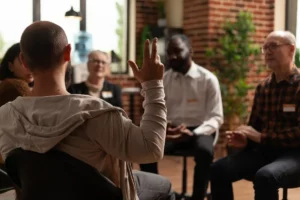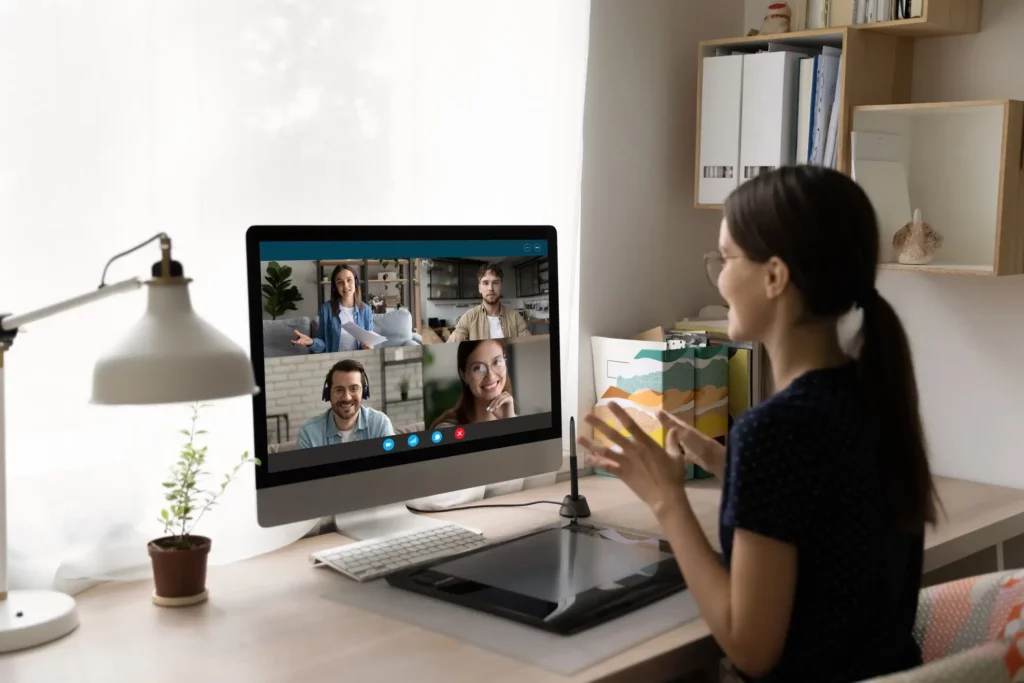In recent years, mental health care has changed a lot, and one big shift is how people are loving online group therapy. This article is all about why online group therapy works, what makes it great, and how it can help you.
Think of it like this: group therapy, where people share and support each other, has gone digital. So, if talking about your stuff face to face seems hard, online group therapy is here to make it easier. So, let’s chat about online group therapy where you explore, grow, and connect with others dealing with the same stuff.
Contents
What Is Group Therapy & Can It Be Taken Online?
 Let’s start with the basics: What exactly is group therapy?
Let’s start with the basics: What exactly is group therapy?
Group therapy is like a team huddle for your mind. It’s a space where a bunch of people, guided by a trained therapist, come together to talk about their feelings, experiences, and challenges. Think of it as a support circle where everyone understands and helps each other out.
Now, here’s the exciting part — can we take this group therapy thing online?
Absolutely! Thanks to the wonders of the digital era, we’ve got a new way to connect and support each other. The rise of online mental health services has made therapy way more accessible. So yes, group therapy can pack its bags and go online too!
Imagine this: You can now join a group therapy session from the comfort of your own space, whether it’s your cozy couch or your favorite coffee shop. No need to worry about travel time or finding the right place; it’s therapy at your fingertips.
So, if you’re wondering whether you can dive into the group therapy experience from the convenience of your screen, the answer is a resounding yes! The online world is ready to welcome you to the supportive realm of group therapy.
What Types Of Group Therapy Are There?

When it comes to group therapy, it’s not a one-size-fits-all situation. Different types cater to various needs and concerns. Let’s break it down:
Support Groups
- Ideal for those dealing with a specific challenge or health condition.
- Provides a platform to share experiences and coping strategies.
- Examples include cancer support groups or grief support.
Cognitive-Behavioral Therapy (CBT) Groups
- Focuses on identifying and changing negative thought patterns.
- Encourages participants to develop healthier coping mechanisms.
- Effective for anxiety, depression, and stress management.
Psychoeducational Groups
- Aims to educate and inform participants about a particular issue.
- Provides tools and knowledge to manage symptoms effectively.
- Often used for conditions like ADHD or substance abuse.
Interpersonal Process Groups
- Centers around improving interpersonal skills and relationships.
- Participants explore and understand their communication patterns.
- Beneficial for those facing challenges in personal relationships.
Skill-Building Groups
- Focuses on developing specific skills like anger management or assertiveness.
- Participants learn and practice new skills in a supportive environment.
- Useful for addressing behavioral issues or improving social skills.
Psychotherapy Groups
- Led by a trained therapist, delves into deeper emotional issues.
- Provides a space for self-exploration and personal growth.
- Effective for individuals dealing with complex emotional challenges.
Art or Expressive Therapy Groups
- Utilizes creative expression to explore emotions and experiences.
- Can include activities like art, music, or drama therapy.
- Particularly helpful for those who find it challenging to verbalize emotions.
LGBTQ+ Support Groups
- Tailored for individuals within the LGBTQ+ community.
- Addresses unique challenges and provides a supportive space.
- Fosters a sense of community and understanding.
Trauma-Focused Groups
- Designed for individuals who have experienced trauma.
- Focuses on processing and healing from traumatic experiences.
- Often involves specialized therapeutic techniques.
Choosing the right type of group therapy depends on your specific needs and preferences. Whether you’re seeking support, skill-building, or a space for self-exploration, there’s a group therapy format that suits your unique concerns and goals.
Effectiveness of Online Group Therapy
Now, let’s dive into the nitty-gritty – how effective is online group therapy?
Well, buckle up because the answer is pretty exciting. Multiple studies underline the effectiveness of online group therapy in handling various mental health concerns, from anxiety to depression.
Benefits of Going Online for Group Therapy

- Accessible Anywhere: Forget about commuting. Online group therapy brings your support network to you with just a click, no matter your location.
- Flexible Timing: Life can get hectic, but online therapy bends with your schedule. Attend sessions when it suits you, putting therapy on your timetable.
- Comfort of Your Space: Your comfort zone is where the magic happens. Participate in online group therapy from your go-to spot, whether it’s your living room or a cozy nook.
- Diverse Perspectives: The online world brings together people from various backgrounds. Get ready for a mix of perspectives that’ll enrich your therapeutic journey.
- Anonymity: For those who prefer a bit of privacy, online group therapy offers a space to share without the pressure of face-to-face interactions, fostering open and honest discussions.
- Community Connection: Even in the virtual realm, online group therapy creates a genuine sense of community. You’re not alone; you’re part of a supportive group navigating challenges together.
In summary, online group therapy isn’t just effective; it’s a practical solution. It provides therapeutic support that seamlessly integrates into your life, offering a variety of benefits to make your path to improved mental health smoother and more comfortable.
How Online Group Therapy Works
 Now that we’re on board with the effectiveness, let’s unravel the mechanics – how does online group therapy actually work?
Now that we’re on board with the effectiveness, let’s unravel the mechanics – how does online group therapy actually work?
1. Virtual Platforms:
Online group therapy operates on virtual platforms specially designed to create a secure and confidential space for therapeutic discussions. Here, you have the freedom to express yourself without worrying about privacy breaches.
- Option 1: MantraCare: A trusted virtual haven where your mental well-being takes center stage. MantraCare ensures a safe environment for your group therapy journey.
- Option 2: TherapyMantra: This platform is crafted for seamless online group therapy experiences. TherapyMantra combines user-friendly features with top-notch security.
2. Facilitators and Moderators:
Every successful online group therapy session has skilled facilitators leading the way. These professionals play a crucial role in guiding discussions, ensuring a safe and supportive atmosphere for everyone involved.
3. Group Dynamics in a Virtual Space:
Navigating group dynamics in the online realm is a unique aspect. It involves the interaction, support, and shared experiences of participants, creating a virtual community that mirrors the closeness of an in-person group.
So, picture this: You log in to your chosen platform, be it MantraCare or TherapyMantra, and you find yourself in a virtual room where a skilled facilitator is ready to guide the group through meaningful discussions. The digital space comes alive with shared stories, support, and a sense of community that transcends physical boundaries.
Online group therapy isn’t just about talking; it’s about connecting in a virtual space where everyone’s journey matters. Whether you opt for MantraCare or TherapyMantra, the goal is the same: creating a supportive and effective environment for your mental health journey.
Challenges in Virtual Group Dynamics
 Navigating virtual group dynamics comes with its own set of challenges. Let’s break them down into simple bullets:\
Navigating virtual group dynamics comes with its own set of challenges. Let’s break them down into simple bullets:\
- Potential interruptions like poor internet connection or audio issues.
- May disrupt the flow of discussions and cause frustration.
- Absence of in-person body language and facial expressions.
- Participants might miss important non-verbal cues, impacting communication.
- Difficulty in reading the virtual room.
- Addressing conflicts or misunderstandings becomes a bit more challenging.
- Some participants may face barriers due to limited access to technology.
- Ensuring everyone has a smooth online experience can be a logistical challenge.
- Participants may find it easier to disengage in a virtual setting.
- Keeping everyone actively involved requires additional effort from facilitators.
- Participants might feel uneasy about discussing personal matters online.
- Coordinating group sessions across different time zones can be tricky.
- Finding a suitable time for everyone may require flexibility.
- Prolonged screen exposure can contribute to participant fatigue.
- Striking a balance between meaningful discussions and screen breaks is essential.
- Ensuring everyone is on the same page regarding online etiquette can take time.
- Participants from diverse backgrounds may interpret virtual interactions differently.
In the world of virtual group dynamics, these challenges are like hurdles in a race. While they may pop up, with some thoughtful navigation and facilitation, they can be overcome.
Conclusion
As we conclude, it’s clear that online group therapy isn’t just a trend; it’s a valuable resource in the ever-evolving landscape of mental health care. It offers accessibility, diverse perspectives, and a sense of community that transcends physical boundaries.
If you’ve been considering taking that step towards mental well-being, consider the flexibility, comfort, and support that online group therapy can provide. The digital era has indeed revolutionized the way we approach mental health, making therapeutic support available at our fingertips.
Ready to embark on your online therapy journey? If you are looking for an affordable Online Therapy, TherapyMantra can help: Book a trial Online therapy session.


